
Theologou was one of the first vehicle manufacturers in Greece. It was created by Nikos Theologos, a Greek mechanic who had lived and worked for a few years in the US, and founded this company after he returned to Athens, Greece in 1906. Around 1916 he designed and constructed a light passenger car with a motorcycle engine; according to his descendants, the efforts had started in 1908, and since 1916 a small number were built. His company, nonetheless, produced a variety of bus and truck bodies, mostly on Ford chassis in the 1920s. By the late 1920s it was facing strong competition by larger companies like Tournikiotis and Athena in Athens, Bouhagier in Patras and others, which also produced vehicles on imported chassis, and was soon eclipsed by them.
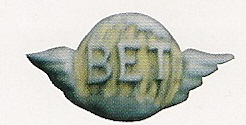
Biotechnia Ellinikon Trikyklon, or BET, was a small vehicle manufacturer founded in Athens by Petros Konstantinou. It was one of several manufacturers - the first appearing in the early 1940s - that converted BMW or other motorcycles into light utility three-wheelers. In 1965 it entirely designed and built a small five-seat passenger car with a BMW 125cc motorcycle engine. Although the type was certified, only one was built due to problems in availability of parts for further production. Following this design, three-wheeled truck models were developed and produced. A second passenger car model was designed and introduced in 1973, known as model 500, with a Fiat 500cc engine. With metal body, seating up to five passengers and featuring very good road handling, it was a rather advanced three-wheeler for its time. It was certified for production and 15 were built, of which one survives to this date in excellent condition. There were even talks with a South African company involving plans for exports or even transfer of production to that country, but they were never realized. The company ceased production in 1975.

MEBEA was an important Greek vehicle manufacturer, producer of light trucks, passenger automobiles, motorcycles, motorbike engines, agricultural machinery and bicycles.
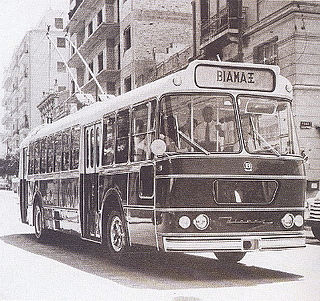
BIAMAX(Proper Greek pronunciation Viamax) was a Greek vehicle manufacturer. In the late 70's it was one of the biggest Greek companies, operating three factories and several other auxiliary facilities throughout the country. In addition, BIAMAX became a leading industry in Greece, in areas including Quality Assurance, technical training, process documentation and Research & Development. Although its main activity was vehicle manufacture, some of its subsidiaries were also involved in areas like tourist services, exports of farm products and shipping.

Petropoulos is today a major importer and distributor of vehicles and heavy machinery, having been, at the same time, one of the historic Greek tractor, vehicle and engine manufacturers.
Mego (ΜΕΓΚΟ) was a Greek light vehicle manufacturer, based in Trikala. Its first products, launched in 1947, were utility tricycles. In 1951, it began manufacturing motorized utility tricycles with 50–100cc engines and an unconventional design in which the solo wheel was located at the rear.

Saracakis Group of companies is a major Greek commercial and industrial group, for two decades a traditional competitor to Biamax. Two of the most talented Greek vehicle engineers who had worked for Biamax, A. Rizos and I. Dracoulis also worked for Saracakis, Dracoulis having designed the company's characteristic, recognizable 'Σ' logo.

STYL KAR was named after its founder, the engineer Stylianos Karakatsanis. Its entire history is representative of many Greek companies who were engaged in the construction of simple utility vehicles.

Alta was a Greek manufacturer of light and heavier three-wheeler trucks, motorcycles and passenger cars. Production of motorcycles and three-wheeler trucks with Sachs 50cc engines started in its first factory in Athens in 1962. The 50S motorcycle model was known for its reliability. In 1967 it designed and developed model A700, a heavier three-wheel truck with 2-cylinder BMW 35 hp engine and a payload of 800 kg. The truck, featuring a pleasant design and high reliability became one of the most successful vehicles of its kind in Greece. In 1968 Alta introduced a three-wheel passenger car, model A200. Powered by a Heinkel 200cc engine, the car was based on the German Fuldamobil, but with Alta's own body design. The company moved production to a new, larger factory in Elefsis where it operated until 1978.

DIM Motor Company, a Greek automobile maker, was created by Georgios Dimitriadis as a successor to his earlier company, Bioplastic S.A., which had produced the Attica automobile. The DIM represented one more effort by Mr. Dimitriadis to design and develop a modern car entirely by his company's own means. A 400cc, air-cooled, 2-cylinder, 30-hp engine was also developed in-house to power the vehicle, but due to delays in the engine development, the car was introduced with a 600cc engine and other mechanical parts of the Fiat 126 model. A 650cc Fiat engine was also used, in an improved version. The car was finally introduced at the Geneva Motor Show in 1977, and for this reason received more publicity than most Greek vehicles, appearing in many international publications. All development work had been made in a factory intended for its production in Acharnes, while the company was advertised in the Greek press; plans were also made for more versions, including a sports coupe. However, the costs involved and the car's poor prospects in the Greek market resulted in termination of production after only about ten had been produced. The whole project was abandoned in 1982, having been Georgios Dimitriadis' last venture in the automotive industry.
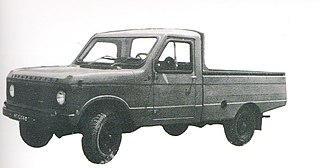
Balkania was the trade name of 'K. Zacharopoulos A.B.E.E.' a Greek industrial and trading company based in Athens that produced 4x4 jeep-type vehicles and 4x4 trucks. Since 1945, K. Zacharopoulos had been involved in vehicle repair and rebuilding. The Balkania company was founded in 1954 and since 1972 it imported Romanian and Indian vehicles. In 1975 it designed and introduced its own Autotractor model, a 4x4 multi-purpose truck with a Mercedes-Benz 3200 cc Diesel engine, metal cabin and a payload of 1,500 kg (3,307 lb). In 1979 the model was redesigned, with a modern synthetic cabin. It was produced, as some similar Greek vehicles, until a change of a favorable categorization for agricultural vehicles in 1984 limited its prospects. The vehicle was modestly successful, as it exhibited certain quality problems.

Scavas is the name of sports cars designed by Greek engineer Vassilios Scavas that were never industrially produced.

EBIAM was a Greek company based in Thessaloniki that, among others, produced 4x4 trucks. It belonged to a generation that benefited from a Greek law classifying any vehicle that could be used for agricultural purposes as "agricultural machinery".
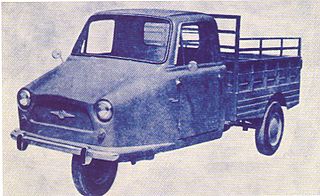
Motoemil was a Greek truck manufacturer based in Thessaloniki. It was named after Emilios Antoniades who started his business, together with his brother Konstantinos, by constructing crude-made trucks assembled from motorcycle and automobile parts. By the mid-1960s, like other similar Greek manufacturers, they were already developing and building complete "automobile" three-wheeler trucks. Motoemil was one of the first of its kind in Northern Greece and soon became the largest in that region, its products sold throughout the country. The first models used 1200cc Volkswagen air-cooled engines. A completely redesigned, more modern-looking model was introduced in 1970, using a German Ford engine.

Candia is a Greek company producing Agricultural machinery and equipment, based in Herakleion, Crete. It is representative of many companies in this country, that produced multi-purpose light farm vehicles.

Emporiki Autokiniton was a major Greek automobile trading and industrial company. Systematic vehicle production started in 1968, while the company built a modern vehicle assembly factory in the north of Athens in 1971. A large number of Mazda, Opel and, later, Alfa Romeo models were assembled – usually with a significant proportion of parts locally produced. The company also introduced modified versions of Mazda trucks, including longer versions of the B1500 and B1600 light trucks. A number of the latter was also produced with the company’s own Grezda brand name in the early 1980s, mostly for export. Emporiki Autokiniton was seriously affected by problems largely connected with the labor unrest of the 1980s in Greece and production was eventually terminated in 1985, after a failed attempt to produce a jeep and a 2-tonne truck type of own development.
Dimadis-Kanakis is a historic Greek engine and metal products manufacturer, based in Volos. It was founded in 1920 by Pavlos Dimadis and Ioannis Kanakis, initially focusing on engine repair and rebuilding. In 1926 the company developed and produced its first semi-diesel engines. Soon an extended range of engine models, up to 120 hp, was developed and the company became one of the best known Greek engine makers, mostly remembered for the reliability of its products. Some exports were also made.

Kouppas, also spelled in English as Couppas or Coupas, has historically been the most famous Greek industrial machinery and equipment manufacturer, founded in Piraeus in 1882.
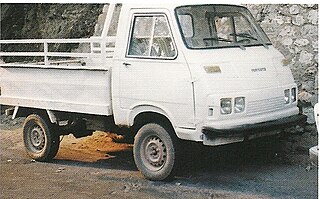
Record A.E.B.E. was the name of a Greek company producing agricultural machinery and vehicles, founded in Heraklion, Crete in 1957 and dissolved in 1999. Its products have included walking tractors, a family of characteristic Greek three-wheel vehicles combining truck and tractor functions, "proper" tractors and four-wheel trucks ; mechanical equipment like clutches and gearboxes for use in its vehicles were also produced. Its main market was Greece, although some of its walking tractors were also exported. Annual vehicle production in the late 1970s and early 1980s averaged 500 units.

Diana (Διάνα) is the brand name for agricultural machinery produced by Irene Chrissadakou A.E. a company located in Tavros (Athens), Greece. Founded in 1976, it is one of the most successful light tractor manufacturers in Greece, also managing to survive the crisis in Greek manufacturing industry of the 1980s and 1990s.


















